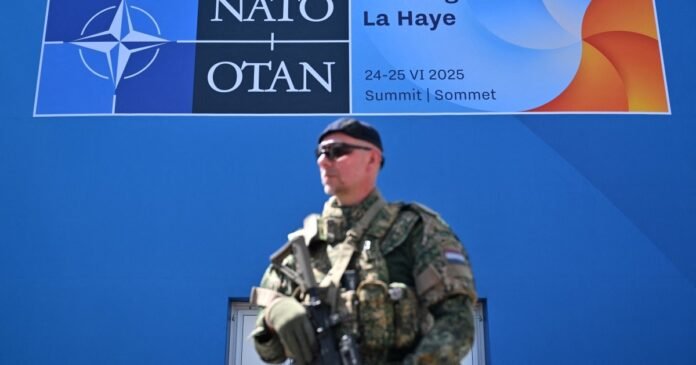As NATO leaders prepare to gather in The Hague on Tuesday, efforts to satisfy United States President Donald Trump’s call for a big new defence spending goal may be overshadowed by the repercussions of US military strikes on Iran.
Trump has demanded that NATO allies commit to spending 5 percent of their gross domestic product (GDP) on defence at their two-day gathering, starting on Tuesday.
The summit is also intended to signal to Russian President Vladimir Putin that NATO is united, despite Trump’s previous criticism of the alliance, and determined to expand and upgrade its defences to deter any attack from Moscow.
On Monday, NATO chief Mark Rutte said the new defence spending pledge to be announced at the summit is fundamental for ensuring that the alliance can deter Russia.
“The defence investment plan that allies will agree in The Hague introduces a new baseline, 5 percent of GDP to be invested in defence,” Rutte said.
“This is a quantum leap that is ambitious, historic and fundamental to securing our future.”
The US bombing of Iranian nuclear sites at the weekend, however, makes the summit much less predictable than Rutte – a former prime minister of the Netherlands hosting the gathering in his home city – and other NATO member countries would like.
In 2003, the US-led war on Iraq deeply divided NATO, as France and Germany led opposition to the attack, while Britain and Spain joined the coalition.
European allies and Canada also want Ukraine to be at the top of the summit agenda, but they are wary that Trump might not want President Volodymyr Zelenskyy to steal the limelight.
Iran adds uncertainty
Much will depend on the precise situation in the Middle East when the summit takes place – such as whether Iran has retaliated against the US – and whether other NATO leaders address the strikes with Trump or in comments to reporters.
On Monday, Rutte told reporters the strikes on Iran over the weekend did not violate international law.
Al Jazeera’s Kimberly Halkett said that currently, European leaders are focused on diplomacy as the path towards de-escalation and limiting Iran from having nuclear weapons. However, an escalation in fighting, including Iran’s targeting of a US military base in Qatar on Monday, makes diplomacy more difficult.
“Given the escalation that has taken place in recent days, that is a task that has become much more challenging to accomplish, which is why this meeting [at the NATO summit] has become so much more critical,” Halkett reported from Washington, DC.
Speaking from The Hague, Al Jazeera’s Hashem Ahelbarra said Rutte’s view is that consensus among NATO allies is almost universal: “Blaming the Iranians for failing to come forward in the past and negotiate a way out with the international community and with the IAEA.”
A dangerous moment for NATO
If the meeting does not go to plan, NATO risks appearing weak and divided, just as its European members see Russia as at its most dangerous since the end of the Cold War and are bracing for possible US troop cuts on the continent.
On Monday, Putin dismissed NATO claims that Russia could one day attack a member of the alliance as lies that Western powers use to justify vast military spending.
Under the new NATO defence spending plan, countries would spend 3.5 percent of GDP on “core defence” – such as weapons, troops – and a further 1.5 percent on security-related investments such as adapting roads, ports and bridges for use by military vehicles, protecting pipelines and deterring cyberattacks.
Such an increase – to be phased in over 10 years – would mean hundreds of billions of dollars more spending on defence.
“The reason they’re doing this is so when Trump comes to the Hague, they’ll tell him: Listen, we’ve been listening to your concerns, therefore, we’re from now onwards committed to the 5 percent benchmark you have been talking about in the past,” said Ahelberra.
Trump has long insisted it is time for Europeans to take on more of the financial and military burden of defending their continent.
Rutte said Monday that Spain had not been granted an “opt-out” from the pledge, despite Madrid claiming it had agreed it would not have to reach the headline figure of 5 percent.
Last year, alliance members collectively spent about 2.6 percent of NATO GDP on core defence, amounting to about $1.3 trillion, according to NATO estimates. The lion’s share came from the US, which spent almost $818bn.
European Union leaders, said Ahelberra, “want to convince Trump that NATO is taking into account his demands, but they’re looking forward to being able to convince Trump to continue to team up with the military allies for the sake of tackling many issues … particularly Ukraine.”
“They don’t want the Americans to abandon the Ukrainians. They don’t want to see the Americans negotiate a settlement with Putin without taking into account the real concerns of Ukraine,” he added.






